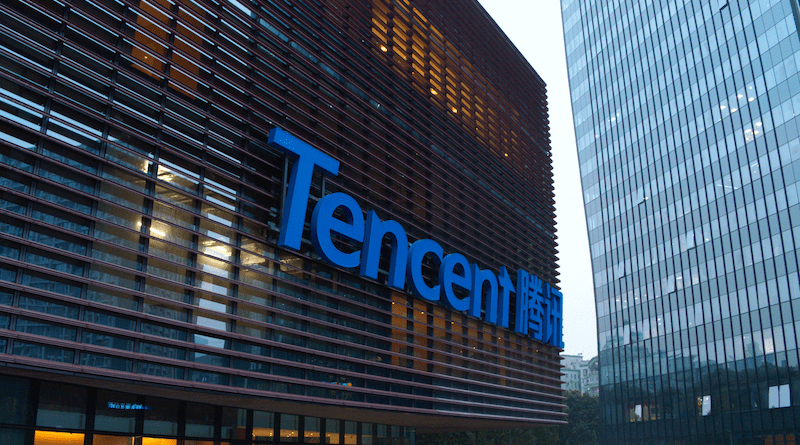What Lies Behind China Unicom-Tencent Joint Venture Plan – Analysis
By Anbound
By He Jun
In recent years, the development of China’s private economy has encountered multiple difficulties amidst the overall challenges the country is facing.
In the fluctuation of economic development, there are many factors that lead to the sluggish development of private enterprises.
First of all, due to the impact of the COVID-19 pandemic, the development of many Chinese private enterprises has been greatly affected. Some small and medium-sized private enterprises have even become unable to survive, and a large number of them have gone bankrupt. Second, as China’s urbanization enters the next phase, the regulation that stipulates residential housing should not be speculated and this will continue for a long time. With the decline of the “land economy” and “land finance”, the real estate market will show a downward trend. Many private houses are expanding at high speed, while enterprises in high debt are falling into debt risk. Third, with the Chinese authorities imposing anti-monopoly measures, cracking down on the uncontrolled growth of capital, as well as rectifying the education sector, a large number of private enterprises in the internet, finance, education, and other service fields have encountered development difficulties. Quite a number of them simply closed down for good. Fourth, with the slowdown of China’s economic growth in recent years, the downward pressure on the economy has increased, and many private enterprises are also in decline. Finally, with the intensification of geopolitical turmoil and the waves of anti-globalization, some private enterprises have suffered setbacks in overseas development.
The Chinese central government’s policy of supporting the development of the private economy has not changed. When mentioning “building a high-standard socialist market economy”, the report to the 20th National Congress emphasized “uphold and improve China’s basic socialist economic systems… unswervingly consolidate and develop the public sector and unswervingly encourage, support, and guide the development of the non-public sector”, and that the Chinese authorities will “work to see that the market plays the decisive role in resource allocation and that the government better plays its role”. Furthermore, the report also noted that China will “deepen reform of state-owned capital and state-owned enterprises (SOEs); accelerate efforts to improve the layout of the state-owned sector and adjust its structure; work to see state-owned capital and enterprises get stronger, do better, and grow bigger”.
This shows that policy-wise, the private economy has been given the same development opportunities and status as the state-owned economy. However, in reality, it is difficult for the private economy to truly be on an equal footing with the state-owned economy.
How then, can private enterprises in China locate new development models and achieve innovative breakthroughs?
On October 27, the official website of China’s State Administration for Market Regulation (SAMR) released the List of Unconditional Approval Cases of Concentration of Business Operators (October 17 -October 23, 2022). The document shows that China Unicom and Tencent will set up a new joint venture. Affected by this news, on the afternoon of November 2, China Unicom’s A-shares rose by the daily limit in late trading. In terms of H-shares, as of 15:00 on November 2, China Unicom rose slightly by 1.2%, and Tencent rose by 1.4%. China Unicom, Tencent, and relevant employee stock ownership platforms will hold 48%, 42%, and 10% of the newly established joint venture, respectively. The newly founded enterprise will be mainly engaging in the content distribution network (CDN) and edge computing business.
Researchers at ANBOUND believe that the cooperation between state-owned enterprise China Unicom and private enterprise Tencent is of exemplary significance that provides a new development model of cooperation between private enterprises and SOEs. With the participation of SOEs, joint ventures or cooperative enterprises will be greatly aided in anti-monopoly, policy access, and financing. Conversely, the advantages of market-oriented private enterprises will be shown in market mechanisms, innovation capabilities, and operational efficiency. If SOEs and private enterprises can work together, they may gain more opportunities in the Chinese market. As for the shareholding ratio of the two parties in the joint venture, under the current situation, it would be more feasible and safer for the joint venture or cooperative enterprise to let the SOEs hold larger shares.
Historically, whenever the market is turbulent, a considerable number of private enterprises have always become the first casualties of the market turmoil. For instance, the financial crisis in 2008 significantly impacted China’s economy, and during that time some private entrepreneurs informed ANBOUND’s researchers that as the market situation was less than optimum, they hoped that their shares could be sold to SOEs and seek greater space of development through the advantages of the latter. In recent years, from the turbulent anti-globalization to the ravaging effects of the COVID-19 pandemic, private enterprises in the country have been hit hard again. The cooperation of private enterprises and SOEs is not only a last resort for the former in the current situation but also the active choice of a considerable number of them. When the talks about such a partnership re-emerge in China and attract attention, private enterprises have to worry about their development prospects.
Final analysis conclusion:
Under the downward pressure of the economy, there have been multiple challenges in the development situation of China’s private economy. Joint ventures and cooperation with state-owned enterprises are becoming an option for some private enterprises in the country. However, this is not the only mode of private economic development. Under China’s socialist market economy system, the private economy should still have market space for independent development and growth.
He Jun is a researcher at ANBOUND

